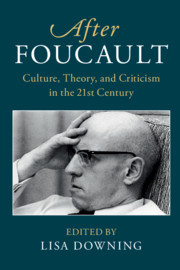Book contents
8 - Foucault and Ecology
from Part II - Coming After Foucault
Published online by Cambridge University Press: 30 May 2018
Summary
Introduction
A Foucauldian perspective offers a number of interesting and significant insights into the relationship between the cultural representations of ‘Nature’ and the processes of subjectification that underpin environmentalism and ecologism. Generally speaking, environmentalism refers to a perspective where one seeks to protect and conserve the natural environment in an effort to keep the planet a habitable (and pleasant) place for humans. Often, environmentalism is a perspective that can be attached to fairly mainstream political ideologies such as liberalism. On the other hand, ecologism, while also advocating the conservation and preservation of the natural world, can be defined as an ideology that places the ecosystem central to its critique of our current socio-political and economic condition and to its future objectives. Ecologists, then, recognize the ecosystem, and its constituent parts, as inherently valuable and seek to preserve and conserve the natural world based on this ethic. From these brief descriptions, it is clear to see that environmentalism and ecologism tend to rely on a clear definition of nature as their focal point. Stemming from this conceptualization of nature, a number of other assumptions flow, such as a valorization of that which is considered natural. The work of Michel Foucault allows us to interrogate environmentalism and ecologism in important and exciting ways by highlighting, and potentially offering a corrective to, the discourses that perpetuate problematic power dynamics, such as (hetero)sexism, racism and speciesism, integral to established environmental/ecological theory and practice. This is because hierarchies determined by gender, sexuality, ethnicity, and species have long been justified through a valorization of that which is considered natural, thereby simultaneously naturalizing inequalities.
That being said, it is perhaps surprising that many scholars interested in the environment have found Foucault's work useful, given that, by all accounts, Foucault appeared to find little inspiration in that which is culturally accepted as ‘Nature’. Indeed, Eric Darier offers an interesting story that suggests that Michel Foucault is an unlikely candidate for generating a robust ecological ethic. Darier recounts how, while on a trip to the Alps, Foucault's colleague Jacqueline Verdeaux compelled him to appreciate a particular vista. Foucault reacted by walking away and exclaiming: ‘My back is turned to it’.
- Type
- Chapter
- Information
- After FoucaultCulture, Theory, and Criticism in the 21st Century, pp. 122 - 138Publisher: Cambridge University PressPrint publication year: 2018
- 1
- Cited by

